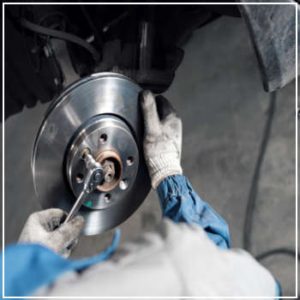 What sounds indicate your brake system may be having issues? Squeaking, growling or vibrations could soon become a serious problem for your vehicle.
What sounds indicate your brake system may be having issues? Squeaking, growling or vibrations could soon become a serious problem for your vehicle.
Basic Brake Operation
At the most basic level, multiple moving parts make up your car’s brake system. The brake pedal is where you place your foot when you want to slow down or stop completely and that motion activates the vacuum booster, which amplifies the force you applied. This combination helps your car come to a halt without much effort on your part.
Within this framework, you have the master cylinder, filled with brake fluid. The master cylinder controls both the front and back sets of brakes, evenly applying pressure to all once you press down on the pedal. At the same time, the brake rotor deflects heat throughout the vehicle, so the brakes won’t overheat.
Your brake system encompasses:
- Rotor: Attached right to the wheel hub, the rotor is the actual disc portion of your disc brake. When the car is in motion, the rotor spins right along with your wheels.
- Caliper: Located right over the brake rotor, the caliper acts like a clamp within the system.
- Brake Pads: This part, along with the brake piston, is located within the caliper and is a key component for stopping your vehicle. Once the piston pushes them into motion, they touch the rotors and through friction, your car slows down and stops. Depending on your car model, the brake pads are either ceramic or metal.
Signs Your Brakes Need Service
How do you know something’s not quite right with your brake system? Once you notice the following, it’s time for a service appointment:
- A squealing, screeching or whistling sound when you use the brake pedal.
- Your pedal feels “spongy” or soft, or you have to press it down farther to stop the car.
- Your vehicle pulls to one side when you apply the brake.
- You feel the pedal vibrating when you press it down.
- Once you press down, the car takes longer than usual to stop.
When the brake pads’ built-in metal components create a squeaking noise, the sound could mean:
- Brake pads are wearing down and getting dusty
- High heat is causing dust or dirt to stick to your pads and rotor
- Improper installation
- Poor surface contact between parts
- Missing anti-rattle clips.
More warning signs include:
- Grinding: Generally, this sound indicates you’ve worn your brake pads down beyond the acceptable limit. However, in a smaller number of cases, the caliper or piston may be rubbing against the rotor.
- Vibrations: If pressing on the brake creates a vibrating or pulsating sensation, the rotor may be worn down or warped.
- Soft and Spongy: When your brake system is perfectly aligned and performing up to par, you’ll feel some resistance or a firm sensation whenever you press down on the pedal. Once that lessens, your system might be dealing with a leak or gap in the brake lines, a poorly aligned pedal or failing brakes.
Brake Repairs
Because your brake system is integral to vehicle operation and your safety, it’s imperative to have it evaluated once you notice any of these signs. After DaSilva’s technicians assess your system and its parts, your car may need:
- Brake Pad Replacement: Simply put, brake pads wear out and need to be replaced. Without them, the brake disc has nothing to rub against and can’t stop your car as effectively. However, worn-away pads are just one problem; a technician may check if the pads are too thin or show cracks.
- Resurfacing or Replacing the Rotor: With brake pad replacement, your rotor may additionally be “turned” or resurfaced, especially if it shows score marks or other serious signs of wear. If there’s not enough material to smooth down, a technician will replace the part.
- Brake Fluid Change: Moisture, heat, debris and air all contaminate your brake fluid. Once your system’s parts begin to erode, those small particles end up in the fluid. If the quality is low or the fluid contaminated, your system may need a brake fluid change or flush.
- Brake Bleeding: Once air gets into your brake fluid line, possibly from a leak or discharge from the master cylinder, your brakes need to be bled to remove the contaminant and restore the system’s performance.
- General Brake Repair: Our team’s certified technicians ensure all parts are serviced and replaced according to your manufacturer’s recommendations.
If your brake system’s performance has decreased over time or you’re noticing one of the above signs, bring your car into DaSilva’s for a diagnostic assessment and repairs. To begin, give our Naugatuck location a call to set up an appointment.





